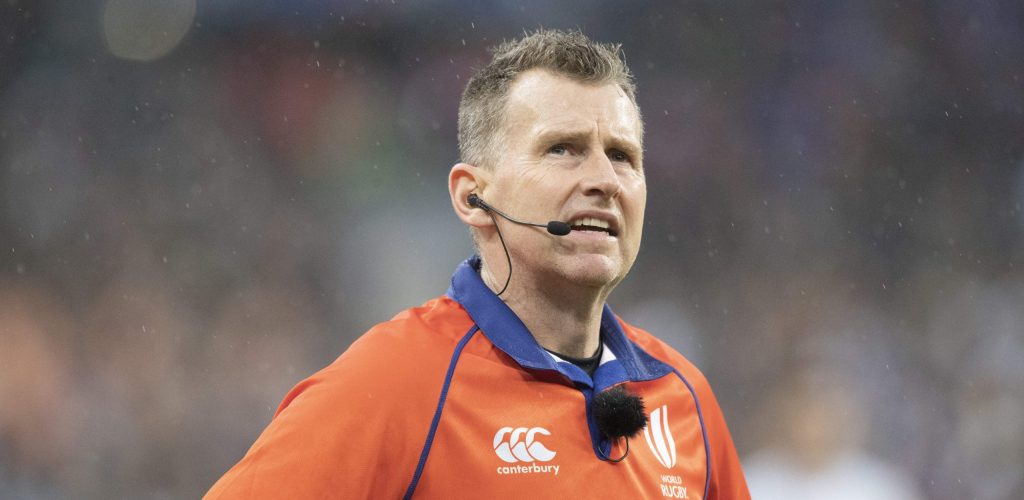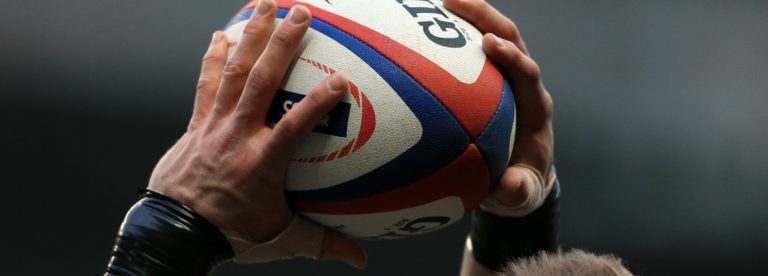Rugby Union
Nigel Owens: VAR can learn a lot from TMO, but TMO needs to be used less during Six Nations

Former international referee Nigel Owens has told us that rugby union’s TMO is used more effectively than VAR in football, but that he would like to see officials become less reliant on the technology during the upcoming Six Nations campaign.
Owens, who retired from international rugby in 2020 after taking charge of 100 Test matches, admits there are pros and cons regarding both the television match official and the video assistant referee, but ultimately he feels that the technology is being overused in rugby union.
“TMO works better than VAR in the way that people know what’s happening,” Owens told us. “When you put a decision up in rugby, it’s explained and shown why the decision is given or changed so that everyone watching the game in the stadium or at home knows exactly why the try was disallowed because he’s knocked it forward. You may not agree but you know why the decision has been made, so it’s better in that context.
“In football, when you’re in the stadium you don’t know why the goal is disallowed. Fans can’t understand it, which is why they get frustrated because they think there’s nothing wrong with the decision, they haven’t seen it again. But if they had seen it again and the referee explained why you are offside, whether they agree with it or not, it’s offside. So the TMO works better in that way.
“But the way it doesn’t work better is it’s used too much in rugby. Football use it much less than we do, though they can definitely use it more effectively like we do, so there’s pros and cons for both. Rugby is more understandable and easier to follow the decisions thanks to TMO but it’s used too much. Football is using it far less than we do, although it’s a far less complex game.”
Owens added: “With the TMO, you need the technology if you want to get the big decisions right. There are some decisions that are humanly impossible for a referee. Did the ball actually touch his hand as he grounded the ball? You’re talking about millimetres. You don’t know that in real time which is why you need to check and that’s what the TMO is there for – to check the things that were impossible for the referee to see, to get those decisions right.
“But it’s not there to referee the game, or for the referee to check every single decision that becomes a try or foul play. It should be used as a last resort when you need it. If we can get back to doing that (in the Six Nations) then it will play an important part in the game. But at the moment, it’s becoming far, far too technical and it’s impacting on the game – too many stops and starts and games lasting two hours because of looking at things that don’t really need to be looked at.”
While Owens feels the TMO in rugby is being overused, he disagrees with claims that the sport has become ‘softer’ since the introduction of the technology.
“Rugby’s not becoming a softer game due to TMO, no certainly not,” he said.” When people look back and say, ‘oh the game has gone soft…’ It hasn’t, that’s for sure. The game is hard, it’s brutally physical. But what the game is now is cleaner. The people that say the game has gone soft are the people that 20, 30, 40 years ago were kicking somebody in the head on the floor, or putting a punch through from the second row into a prop’s face, or headbutting somebody… That’s not hard, that’s dirty. Those are cheap shots and cowardly actions. The game is cleaner now, it’s safer and better, but it’s certainly not softer. It’s still hard but what brings in the player safety issues are the big hits and tackles where you get it wrong and have a huge impact on the head. That’s not dirty, it’s the physicality of the game.”
Owens feels the TMO as well as decisions around foul play will prove to be the major refereeing talking points of this year’s Six Nations.
“There’s always going to be big talking points,” he said. “I hope it doesn’t come down to wrong or right on red cards, or a lack of or too many yellow or red cards for the wrong reasons. If there are going to be controversies, and I hope I’m wrong, it’ll be around foul play – was the red card correct or why wasn’t one given? Or there will be too much conversation around TMO decisions, because once you’ve got the TMO it becomes very technical and scrutinised and that’s when you bring the controversy into it. It won’t be around refereeing performances because we have talented referees. It’ll be around foul play decisions or a lack of them and TMO outcomes. These will be the big talking points.”
Owens won’t be refereeing at this year’s Six Nations, which gets under way on Saturday, and he admits he will miss not being involved in the action.
“My favourite Six Nations moments were always arriving at the stadium,” he said. “When you’re walking into the stadium and all the crowd are there waiting for the team to arrive, and then you walk out to warm up and the crowd and atmosphere starts building… The special moment is walking out from the changing room with the two teams, walking out onto the pitch into the cauldron of noise and the anthems. Once you kick off, you’re in the zone and everything else doesn’t matter. But that build-up to the first whistle, that’s the most special thing and that’s what I miss. I don’t miss the refereeing camps and all the travelling and the pressure of refereeing and the training. I miss that build-up from arriving at the stadium to kick-off, that really is something special.
“I remember 2018 up at Murrayfield (when Scotland beat England 25-13), the only Calcutta Cup I did. There was a little feeling in the air that Scotland could beat England that day. The stadium was buzzing, the crowd outside, the atmosphere… The atmosphere that day was something very, very special. It was special to be part of that. And that’s what makes the Six Nations so special: the spectators, the crowds, the atmosphere.”
As for this year’s Six Nations, Owens is tipping France for glory and feels the Stade de France will play a pivotal role.
“France are the favourites for good reason due to their form,” he said. “The reason I would say France is because the way the fixtures have fallen… England and Ireland have got to go to Paris, and I just can’t see France lose those games at home.
“Paris is the most hostile Six Nations stadium I refereed at. When the French aren’t happy with you, which is quite often when you’re refereeing, they definitely do let you know. It can certainly be pretty hostile there.”
While Owens found Paris a hostile place to officiate at, he says former France captain Thierry Dusautoir was the player he enjoyed refereeing the most.
“I always found Thierry Dusautoir, the French captain, such a wonderful player and wonderful captain, always so respectful and polite,” he said. “Even if France had lost a game or he felt hard done by, he was always respectful and would thank you for the game. To me he was a true, true genuine example of the ethos of the game. As far as difficult goes, the scrum-halves were always the most difficult! You always knew you were in for a ride. None were hard to referee in a disrespectful way, but because of their passion for the game.”
Check out all the latest rugby union betting odds at William Hill






